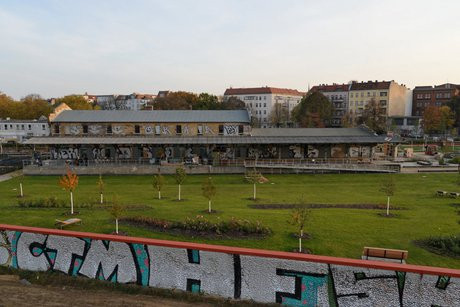Zentrum für Kunst und Urbanistik Berlin
In the frame of this Open Call, ZK/U wants to encourage thinking and acting that is unencumbered by ecological, economic and social crisis, foster questions about citizen participation in the urban and artistic field. We argue, like Chantal Mouffe, in the favor of a society of agonism, that foster debates and dissensus.
Research ranging from looking at Kibbutzim to the myth of the 'benevolent dictator', from anarchy to the commune, from Freemasons to the colonization of Mars, from community gardens to gated communities, how can 'living together' be looked at in a radical and unobstructed way, while taking into account the need for individual distinction.
We would like to explore the idea of community without referring to or attempting to finding solutions for current disasters or crisis. We want to discuss past and present, structured and informal, radically democratic and non-hierarchical models of community and society. ZK/U places itself in the interim space between utopias and today’s reality, confronting and challenging them. What does it mean to demand participatory industries, decentralised energy production, co-owning systems and time banks? What do we demand, when opposing gentrification, still wanting to improve living conditions for all? Is that possible?
In fact, ZK/U welcomes research projects and artistic practices that examine, question and present forms of community beyond the boundaries of crisis management. We aim to foster the resident’s initiatives to use ZK/U as an experimental platform for conversational formats and research projects. Like Augusto Boal, with his “invisible theater” or Stephen Wright’s affection for “stealth” art, we’re interested in engagement with random sectors of the population rather than with a trusted group of fellow artists and people used to the art language. “The artist is a secret agent in the real world, with an artistic agenda”. (Stephen Wright quoted by Pablo Helguera, Education for Socially Engaged Art, JPB 2011).
Our conceptual position naturally implies the breach of traditional medium-discipline frames. Is there a common ground in the merging of arts and sciences that is inclusive of, while not being restricted by, the complex dogmas of conventional disciplinary thinking? Through theory and practice we aim to locate a third space for such thinking, while at the same time asking ourselves if this conversation between disciplines can be accessed and gain new autonomy.
Over the past decade, a discussion has emerged on how academic and artistic forms of knowledge production can mutually engage each other. These discourses first became visible in interdisciplinary research and practice fields and have recently arrived in academic and artistic institutions. These debates usually refer to such collaborative work as 'artistic research' and depending on the perspective, lament what is thought to be lost in the process: freedoms (art) or the lack of a systematic basis (science). Seldom is the concept of a third space uniting those seemingly incongruous poles in an unknown mode of knowledge production taken into consideration.
Instead of looking at was is lost, ZK/U invites speculation on a third space of knowledge production by focusing on the benefits and synergies that materialize through disciplinary encounters.
The incipient third space is not concerned with effects and results (in art: 'work of art', in the sciences: publication / report), but rather with the processes coming from each field. We aim to create an environment in which it is not the outcome but the inherent processes of trial and error which are made visible to the public and laid bare for critique.
